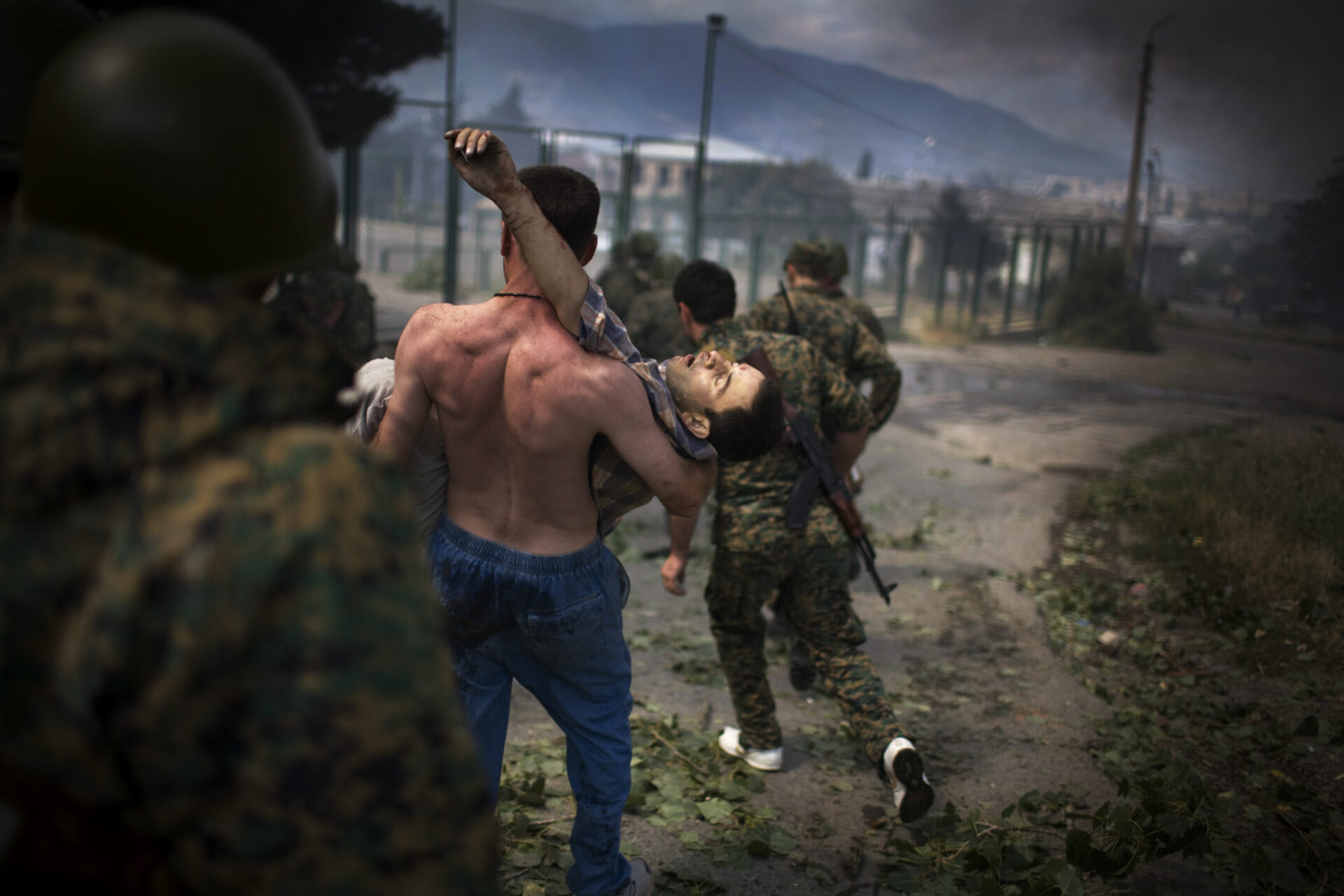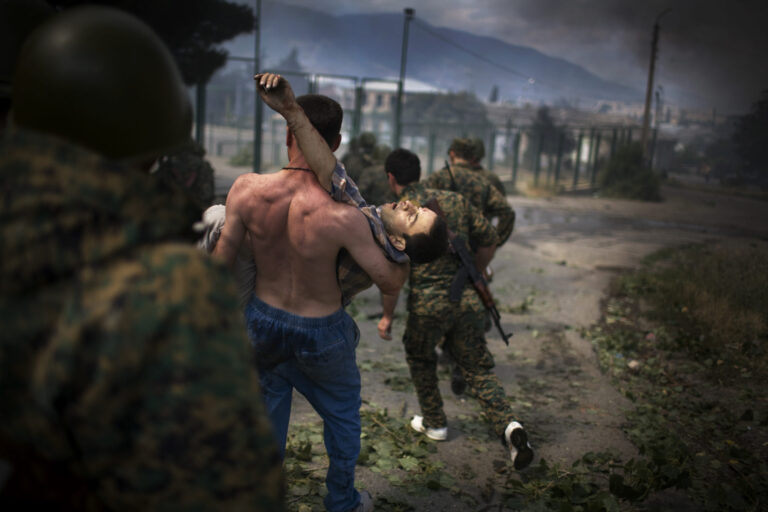“Circles close to Kremlin are trying to turn the border city of Przemyśl into Polish Belfast. They are doing it through reviving long standing disagreements between Poland and Ukraine, and with help of the local radical nationalists,” says Marcin Rey, the creator of a Facebook profile „Russian 5th Column in Poland’ in a conversation with an Eastern politics expert.
Mateusz Bajek: You have been watching activities of Kremlin’s supporters and Russian information warfare in Poland for almost four years now. Propaganda efforts have increased at the time of Ukrainian Maidan crisis, annexation of Crimea and the war in Ukraine.
Marcin Rey: Precisely. All evidence suggests that Putin has been planning his actions in Ukraine for a while. And because Russian government entered a new imperial expansion stage, they had to neutralize Poland for geopolitical reasons. It was convenient for Kremlin to bring our country to an anti-Ukrainian crisis – and to an extent, thanks to propaganda efforts, they succeeded.
Can you see the results of Russian disinformation activities in Poland?
It cannot be denied that Russian information war has strongly influenced Polish society – which is the gateway to the Polish government. It doesn’t mean that most Polish citizens need to have pro-Kremlin views in order for our politicians to take them into consideration during their decision-making process. It will be enough if the group convinced to ideas that are convenient for Kremlin becomes part of the ruling party’s electorate. This way the ruling party will have to take their views into account if they want to keep their power – and win in the next parliamentary elections, for example. The party might start to slowly change their policies, and soften their anti-Kremlin rhetorics and start employing anti-Ukraine, anti-EU or anti-NATO rhetoric instead.
If we look at the changes that took place on Polish political scene since 2013 we have to admit that the influence of Russian informational warfare has been rather substantial.
Which groups are most vulnerable to Russia’s information warfare?
Russia has been trying to affect the views of extreme left and extreme rights all over Europe. Those groups consist of most people who believe manipulated or plain fake information. Then those people build their political views on the basis of this information. Attracting extreme circles is a syncretism initialized by a philosopher with close ties to Kremlin, Alexander Dugin. Hence it shouldn’t be a surprise to anyone that we could see Czech communists or neo-fascists from Germany and, sadly, from Poland, at the Crimean referendum organized by Russians in 2014.
That’s why – speaking of Poland again – we must conclude that due to our left being remarkably weak, Russian propaganda reaches mostly various extreme right and conservative circles.
Still, the only openly pro-Russian party in Poland is left-wing.
The pro-Kremlin Zmiana (Change) Party indeed was created on the left side of the Polish political scene – it grew from maoist and stalinist organizations. But let’s not forget that it also embraced fascist organizations. Zmiana was a pseudo-left party – an example of Eurasian syncretism.
For many reasons (including personal disagreements) this project, under the lead of Mateusz Piskorski has failed and the party ceased to exist. Piskorski himself is now arrested under allegations of cooperating with Russian intelligence.
It’s also worth to pay attention to the narrative promoted by the largest Polish leftist party, Sojusz Lewicy Demokratycznej (SLD – the Democratic Left Alliance) during Maidan. They tried to threaten people with Ukrainian Bandera followers. They also initiated another anti-Ukrainian campaign in early 2015. This time they warned against Ukrainian nationalism. Such initiatives never come from nowhere.
You say that Russian propaganda has the strongest grip over extreme right and conservatives in Poland. It seems that Polish recent Eastern territories (Kresy) have been affected the most.
Kresy should not be considered together with extreme right. Kresy communities have been long ignored by Polish political elites, and their demands – such as commemorating the genocide of Poles in Volhynia by the Ukrainian army during World War II – fell on deaf ears. It’s one of the reasons why those groups have radicalized their views, especially towards Ukraine and Ukrainians. Recently the people from Kresy (and those connected to Kresy by birth or heritage) have been joined by people with no connection to their region, but promoting opinions that are convenient for Kremlin. One of those people was an extremely anti-Ukrainian priest Tadeusz Isakowicz-Zaleski. He has founded a Honorary Committee of the National Day of Remembrance of Victims of Genocide against Poles in Kresy. He invited extremely radical groups – including members of neo-fascist groups – to work with the Committee. Such anti-Ukrainian and pro-Russian indoctrination is leading Kresy communities astray.
Another group that seems to be strongly affected by Russian informational warfare seem to be nationalist groups – which, until recently, were the most active initiators of anti-Russian actions in Poland. Would you agree with that?
I would. Russian informational war is especially visible among the leaders of this group. Not only they believe in Kremlin’s propaganda – they also help to disseminate it even further, either thoughtlessly or cynically. The website Kresy.pl often features articles written by the representatives of Poland’s most famous nationalist organization – Ruch Narodowy (the National Movement), appealing to their readers to „sell Poland’s neutrality to Russia for a high price”. It seems that Russian informational warfare is definitely less effective among ordinary members of nationalist organizations. However, it did achieve something: now those people are not only mostly anti-Russia, but also anti-Ukraine.
In recent times we hear a lot about allegedly pro-Russian attitudes of our current PiS (Law and Justice) government and its representatives. Is it possible that Polish government gave in to Kremlin’s informational warfare?
We can’t say that Law and Justice has adopted the narratives of far-right circles, which often happen to be pro-Russian. However, disinformation and informational warfare have brought Russia some success. It applies – for example – to our current government’s Eastern policy, or should we rather say, the lack of such. In my opinion, this is a result of political pragmatism of Law and Justice politicians who don’t want to lose some of their electorate, especially the voters who are strongly against Poland working more closely with Ukraine. I think it could be caused by closer than before ties between extreme right and the most conservative wing of Law and Justice party.
But Law and Justice politicians do take part in events and initiatives that attract extremely radical groups.
It’s true. Again, let’s look at the Honorary Committee of the National Day of Remembrance of Victims of Genocide against Poles in Kresy. The initiative was supported by prominent representatives of the Polish government, such as Deputy Minister of Justice Patryk Jaki or Deputy Minister of Defense Michał Dworczyk.
Those pro-Russian and anti-Ukrainian narratives promoted by such organizations as the Committee – consisting largely of extreme nationalists and fascists – radiate onto representatives of the Polish government. And it might directly affect their entire decision-making process.
We should also mention that pro-Russian circles are trying to turn Przemyśl – an important city on the border between Poland and Ukraine – into our own Belfast, using long standing disagreements between Poland and Ukraine, and with help of the local radical nationalists. They have inflicted attitudes of strong hostility towards Ukraine there. At the same time, the same circles have found their way to local divisions of national structures – such as the Institute of National Remembrance – and they have been using those institution for promoting Kremlin-approved ideologies. In this case: anti-Ukrainian one. All those factors influence politicians and members of local governments from this region of Poland. As a result, those politicians often take part in actions and initiatives that antagonize both nations instead of promoting cross-border cooperation with Ukraine. Considering that in 2015, Law and Justice got 53% of all votes cast in Podkarpackie District (which was the highest result in the whole country) we can see how the attitudes from local fractions can affect policies of the whole ruling party.
Have you found any proof those propaganda efforts might be inspired by the Russian Foreign Intelligence Service?
Based on the analysis of open sources (OSINT) I use, it’s hard to establish that inspiration of any person or political movement could come directly from Russia. What we do know is that the opponent uses the method of reflexive management. This method, which Russians have mastered, requires using indirect action-reaction influence in order to gradually bring people to certain movements they find beneficial – and so does Kremlin. It could be compared to the movement of balls on a pool table – the player only hits the first one, but they can make all other balls move with it.
There are many methods of such influencing: they include troll factories, hired commentators on news websites and social media, and fake news. This information is then picked up and disseminated by various circles in Poland: could be people with ideological links with Russia as well as those who simply believe Russian propaganda. The case of Alexander Usovsky (read VSquare’s story on Usovsky – part 1 and part 2) shows us that Russian informational war and fake news is not always the source of all moves made by the Polish pro-Kremlin circles. This scandal also shows very clearly that the network of influence in Poland is decentralized – it’s not a stiff hierarchy of agents.
Your Facebook fanpage „Russian 5th Column in Poland” is the most well-known Polish project explaining Russian informational warfare in Poland. What was your motivation to embark on this project?
My motivation came both from inherent patriotism and the fact that I’ve noticed a certain threat which should be prevented. I feel that Poland hasn’t been doing much to fight Kremlin’s informational warfare – neither our current government or the previous one has. That’s why I decided to create and develop this project together with a group of my friends, who would like their names to remain private. We could be compared to a grassroots movement of our territorial defense. The people in official defense structures are training and prepare for the war. What we do is essentially the same, but the stage of our actions is information warfare. Their war is not here, but the latter has been going on for a long time now.
Which Central-Eastern European country is doing the best job at defending itself against Kremlin’s informational warfare?
Among the V4 countries, Czechs are the best in resisting Kremlin’s informational sabotage. Compared to them, Poland falls far behind. Apart from substantial input of Czech administration, we should also take notice of the work done by Jakub Janda, who is the Head of the Kremlin Watch Program
Still, the real headquarters of resistance in our part of Europe is Ukraine. Solidarity with Maidan became incentive for first contact between various European circles and groups which are now fighting Russian propaganda. Such organizations as StopFAKE and InfoNapalm for example, are doing a great job.
Polish analyst specializing in Eastern Europe. Employed in Esperis Consulting and Political Accountability Foundation. Since 2017 working with Fundacja Reporterów (Reporters Foundation) as an expert.






